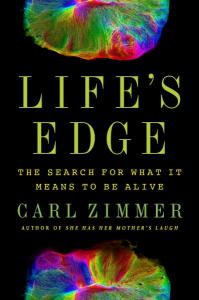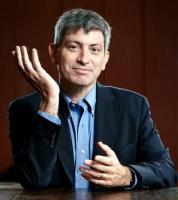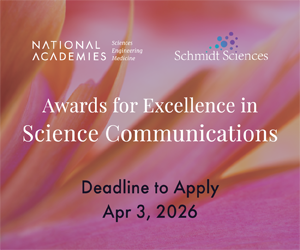
Carl Zimmer: Life's Edge—The Search for What It Means to Be Alive
THE SEARCH FOR WHAT IT MEANS TO BE ALIVE
Carl Zimmer
Dutton, March 9, 2021, $28.00
ISBN-10: 0593182715; ISBN-13: 9780593182710
Zimmer reports:
I have written about life for thirty years as a journalist, covering everything from the Human Genome Project, to the search for alien organisms on other planets, to the sinister marvels of parasitic wasps. Along the way, I've always been fascinated by the fact that scientists who study life in its many forms don't agree on what life is.
I grew interested in how scientists define life and how they draw the lines that divide the living world from the non-living. Our own lives are surrounded by that borderland, with birth on one side and death on the other. Chemists are creating combinations of compounds that behave in life-like ways. Astrobiologists are trying to come up with a method to recognize life elsewhere in the universe and distinguish it from lifeless chemistry.My agent Eric Simonoff brought my proposal to Stephen Morrow at Dutton. He had edited my previous book, She Has Her Mother's Laugh: The Powers, Perils, and Potential of Heredity.
Once Morrow decided to take the book, I visited NASA's Jet Propulsion Laboratory to build chemical gardens, traipsed into an abandoned graphite mine with scientists studying hibernating bats, fed rats to pythons as I learned about their extreme metabolism, and visited a lab where slime molds solve mathematical puzzles. I also talked with philosophers and historians to place this new research in the context of centuries of science and debate about what it means to be alive.
My biggest challenge was the pandemic. The lockdown prevented me from taking the last few trips I had planned for research for the book. I decided to turn lemons into lemonade, reorganizing my book to leave out the topics I couldn't research and distilling the book into a tighter, shorter work.
I think this experience contains a lesson I would offer to beginning authors: don't think of your book as having an infinite length. Once you come up with an idea for a book-scale narrative, keep looking for things you can cut out to keep it short. A taut book is far better than a sprawling one.
Contact info
- Carl Zimmer, 917-863-0212, carl@carlzimmer.com, https://carlzimmer.com/books/lifes-edge/, @carlzimmer
- Book: https://www.penguinrandomhouse.com/books/639396/lifes-edge-by-carl-zimmer/9780593182710/
- Publicist: Amanda Walker, 212-366-2212, amwalker@penguinrandomhouse.com
- Agent: Eric Simonoff, 212-903-1160, esimonoff@wmeentertainment.com
NASW members: will your book be published soon? Take advantage of this opportunity for shameless self-promotion. Submit your report for Advance Copy.
Tell your fellow NASW members how you came up with the idea for your book, developed a proposal, found an agent and publisher, funded and conducted research, and put the book together. Include what you wish you had known before you began working on your book, or had done differently.
See https://www.nasw.org/advance-copy-submission-guidelines.
Review Advance Copy archives at https://www.nasw.org/member-article/advance-copy.
Thinking of writing a book? If you are a NASW member, you may access a list of more than 150 books and online resources to help you create your book proposal, find an agent and funding sources, negotiate your contract, learn about self-publishing, publicize and market your book, and more at https://www.nasw.org/article/write-book.
Send book info and questions about book publishing to Lynne Lamberg, NASW book editor, llamberg@nasw.org.
Follow @LynneLamberg on Twitter for news about science/medical books and writing.
Hero image by Andrzej Rembowski from Pixabay
Advance Copy
The path from idea to book may take myriad routes. The Advance Copy column, started in 2000 by NASW volunteer book editor Lynne Lamberg, features NASW authors telling the stories behind their books. Authors are asked to report how they got their idea, honed it into a proposal, found an agent and a publisher, funded and conducted their research, and organized their writing process. They also are asked to share what they wish they’d known when they started or would do differently next time, and what advice they can offer aspiring authors. Lamberg edits the authors’ answers to produce the Advance Copy reports.
NASW members: Will your book be published soon? Visit www.nasw.org/advance-copy-submission-guidelines for information on submitting your report.
Publication of NASW author reports in Advance Copy does not constitute NASW's endorsement of any publication or the ideas, values, or material contained within or espoused by authors or their books. We hope this column stimulates productive discussions on important topics now and in the future as both science and societies progress. We welcome your discussion in the comments section below.




